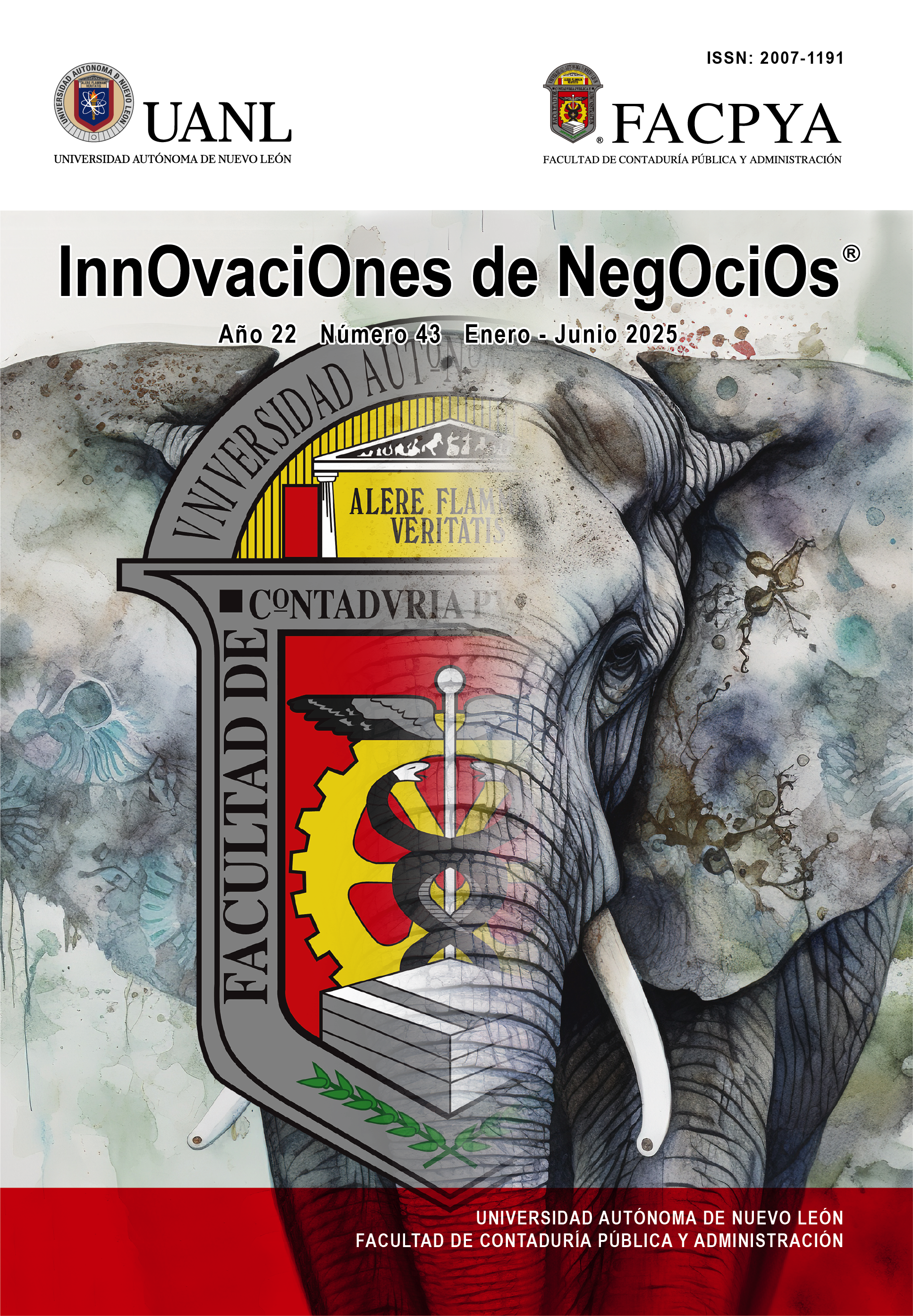Coffee Value Chain in the Sierra of Zongolica, Veracruz
DOI:
https://doi.org/10.29105/in22.43-470Keywords:
Red de valor, desarrollo rural, cafeticultura, estrategia de negocioAbstract
The study aimed to characterize the value chain of coffee in the Sierra de Zongolica region of Veracruz, Mexico. A survey was conducted among 355 coffee producers across three municipalities. Data was collected on production systems, socioeconomic characteristics, market dynamics, network actors, business models, and coffee cultivation trends. Statistical analyses were employed to describe social indicators using FAOSTAT and SIAP data. Findings revealed a global and national decline in cultivated area and production. Regional producers primarily commercialize coffee cherries locally. The value network consists predominantly of small-scale producers who cultivate and market coffee independently, participating in a global trade network dominated by large transnational conglomerates. The presence of suppliers and promoters within the network is minimal, perpetuating the traditional system of selling green coffee cherries. The primary business model involves the sale of raw commodities without added value. However, some producers are innovating by processing coffee and differentiating their product based on environmental attributes and origin. The study highlights the need for a network orchestrator to integrate producers and promote coffee cultivation that preserves biodiversity, involving producers from indigenous communities with a strong cultural identity.
Downloads
References
Angelucci, F., & Conforti, P. (2010). Risk management and finance along value chains of Small Island Developing States. Evidence from the Caribbean and the Pacific. Food Policy, 35(6), 565-575. https://doi.org/10.1016/j.foodpol.2010.07.001 DOI: https://doi.org/10.1016/j.foodpol.2010.07.001
Bamberger, M. (2000). Integrating Quantitative and Qualitative Research in Development Projects (M. Bamberger, Ed.). World Bank. https://doi.org/10.1596/0-8213-4431-5 DOI: https://doi.org/10.1596/0-8213-4431-5
Briones-Ruíz, G., Díaz-José, J., Flores-Verduzco, J. J., Farrera-Vázquez, I. C., & Martínez-González, E. G. (2021). Los vínculos sociales y la adopción de buenas prácticas de producción entre productores de café en Zongolica, Veracruz, México. CIENCIA ergo sum, 28(2), 1-15. https://doi.org/10.30878/ces.v28n2a3 DOI: https://doi.org/10.30878/ces.v28n2a3
Camacho-Velázquez, D. (2016). Los pequeños cafeticultores de Chiapas. Organización y resistencia frente al mercado. Liminia, XIV, 212-216. DOI: https://doi.org/10.29043/liminar.v14i2.471
Carreto, G., Alberto, J., Cuevas, G., Araceli, L., Cortez, L., Esperanza, J., & Vidal, M. (2015). Redes sociales empresariales y desarrollo local. Revista Mexicana de Agronegocios, 159-172.
Figueroa-Hernández, Esther Pérez-soto, F., & Godínez-Montoya, L. (2012). La producción y el consumo del café (ECORFAN, Ed.; Primera).
INEGI. (2010). Compendio de información geográfica municipal 2010. Zongolica, Veracruz de Ignacio de la Llave. (Técnico No. 5; Municipios, p. 23). INEGI. https://www.inegi.org.mx/contenidos/app/mexicocifras/datos_geograficos/30/30201.pdf
Jha, S., Bacon, C. M., Philpott, S. M., Rice, R. A., Méndez, V. E., & Läderach, P. (2011). A Review of Ecosystem Services, Farmer Livelihoods, and Value Chains in Shade Coffee Agroecosystems. En W. B. Campbell & S. López Ortíz (Eds.), Integrating Agriculture, Conservation and Ecotourism: Examples from the Field (Vol. 1, pp. 141-208). https://doi.org/10.1007/978-94-007-1309-3 DOI: https://doi.org/10.1007/978-94-007-1309-3_4
Jurjonas, M., Crossman, K., Solomon, J., & Baez, W. L. (2016). Potential Links Between Certified Organic Coffee and Deforestation in a Protected Area in Chiapas, Mexico. World Development, 78, 13-21. https://doi.org/10.1016/j.worlddev.2015.10.030 DOI: https://doi.org/10.1016/j.worlddev.2015.10.030
Klerkx, L., & Leeuwis, C. (2008). Balancing multiple interests: Embedding innovation intermediation in the agricultural knowledge infrastructure. Technovation, 28(6), 364-378. https://doi.org/10.1016/j.technovation.2007.05.005 DOI: https://doi.org/10.1016/j.technovation.2007.05.005
Moreno, R., & Ramón, J. (2014). ¿Es posible desarrollarse entorno al café orgánico? Las perspectivas de un negocio local—Global en comunidades mayas. Antipoda, 23.
Nalebuff, B. (1997). Co—Opetition Business is War and Peace. Strategy & Leadership, 25(6), 28-35. DOI: https://doi.org/10.1108/eb054655
Neilson, J. (2008). Global Private Regulation and Value-Chain Restructuring in Indonesian Smallholder Coffee Systems. World Development, 36(9), 1607-1622. https://doi.org/10.1016/j.worlddev.2007.09.005 DOI: https://doi.org/10.1016/j.worlddev.2007.09.005
Ocón, H. B. F. (2006). Cadenas , redes y actores de la agroindustria en el contexto de la. Espiral, Estudios sobre Estado y Sociedad, XIII(37), 97-122.
Ortega, A., & Ramirez, B. (2012). Crisis de la cafeticultura y migración en el contexto de pobreza y marginación. Ra Ximhai, 9, 173-186.
Padrón, B. R., & Burger, K. (2015). Diversification and Labor Market Effects of the Mexican Coffee Crisis. World Development, 68, 19-29. https://doi.org/10.1016/j.worlddev.2014.11.005 DOI: https://doi.org/10.1016/j.worlddev.2014.11.005
Sánchez, N. H. J., Suárez, J. A. C., & Sangerman-Jarquín, D. M. (2017). Pluriactividad y agricultura familiar: Retos del desarrollo rural en México. Revista Mexicana de Ciencias Agrícolas, 8(4), 949-963. https://doi.org/10.29312/remexca.v8i4.19 DOI: https://doi.org/10.29312/remexca.v8i4.19
SIAP. (2025). Avances de Siembra y Cosecha, México. (Númerico No. 1; Versión 1). SIAP. http://infosiap.siap.gob.mx:8080/agricola_siap_gobmx/ResumenProducto.do
USDA. (2015). Coffee: World Markets and Trade. En Coffee: World markets and trade.
Vorley, B., & Barnett, A. (2010). Agricultores de pequeña escala en el mercado globalizado: Tomando decisiones en un mundo cambiante (Primera). IIED/Hivos/Mainumby.
Wu, R. M. ; Y. S. X. (2009). Business Model Innovations in China: From a Value Network Perspective Xiaobo WU. Engineering Management, 57(1), 0-9.
Downloads
Published
How to Cite
Issue
Section
License
Copyright (c) 2025 Gregorio Briones Ruiz, Hilario García Martínez, Gilberto Alfredo Lu Ibarra, Alma B. Morales-Guzmán

This work is licensed under a Creative Commons Attribution-NonCommercial-ShareAlike 4.0 International License.
The InnOvaciOnes de NegOciOs magazine is a free and open access electronic magazine of a scientific-academic nature and is a publication of the Autonomous University of Nuevo León, in which the authors retain their copyright and grant the magazine the exclusive right to first publication of the work. Third parties are allowed to use the published content, as long as the authorship of the work is acknowledged and the first publication in this journal is cited.
For more information, please contact the Research Secretary (FACPyA) of the Autonomous University of Nuevo León. Telephone: (81) 1340-4430. Email: revinnova@uanl.mx










